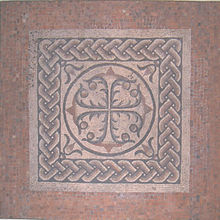
Restitutus
Did you know...
This selection is made for schools by a children's charity read more. Click here to find out about child sponsorship.
| Restitutus | |
|---|---|
| Bishop of London | |
 Mosaic floor from a house in Roman London. |
|
| Diocese | Diocese of London |
| Predecessor | Hilarius |
| Successor | Guitelinus |
| Personal details | |
| Denomination | Roman Catholic |
Restitutus (fl. 314) was a Romano-British bishop of London in the early 4th century.
History of the see
Christianity arrived in the British Isles in the 1st or 2nd century (probably via the tin trade route through Ireland and Spain). Londinium, as it was then known, had become a city that prospered and superseded Colchester as the capital of the Roman province of Britannia. At its height in the 2nd century AD, Roman London had a population of around 60,000. It is certain that a metropolitan bishop was working in London in the early centuries of the Christian era. The recorded antiquity of the office dates back to ancient times where sixteen named archbishops are listed by Jocelyne of Furness in his work Bishops. It has been noted that this is the sole available source of these names, however, the earlier of the two bishops named Restitutus is known to have existed as he is named as attending the Council of Arles in 314.
Council of Arles
The first council of Arles formally condemned the heresy of Donatism. It began as an appeal by the Donatists to Constantine the Great against the decision of the Roman Council of 313 under Pope Miltiades. This is the first instance of an appeal of a Christian party to the secular power, and it turned out unfavorably to the Donatists who afterwards became enemies of the Roman authorities. The Council of Arles was the first called by Constantine and is the forerunner of the First Council of Nicaea. Augustine of Hippo called it an Ecumenical Council, but it was not recognized as such..
The council excommunicated Donatus and passed twenty-two canons concerning Easter (which should be held on one and the same day), against the non-residence of clergy, against participation in races and gladiatorial fights (to be punished by excommunication), against the rebaptism of heretics, and on other matters of discipline. Clergymen who could be proven to have delivered sacred books in persecution (the traditores) should be deposed, but their official acts were to be held valid. The assistance of at least three bishops was required at ordination.
Nothing else is known about Restitutus, although he may have lived long enough to be part of the delegation from Britannia to the First Council of Nicaea.
